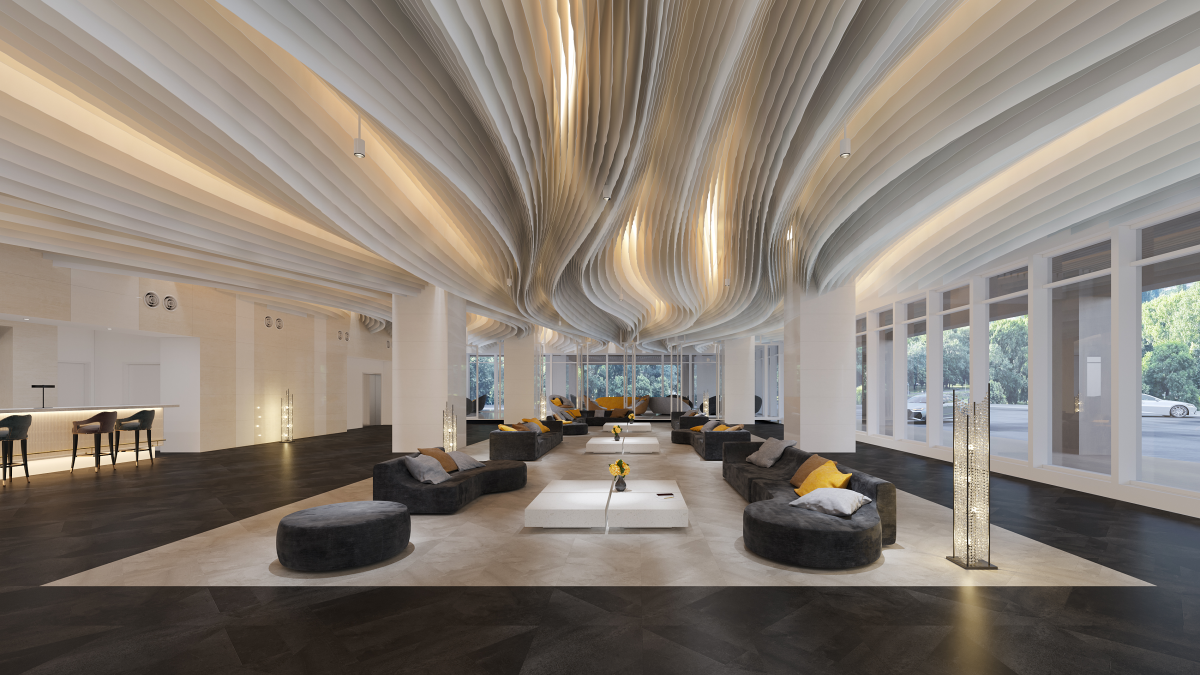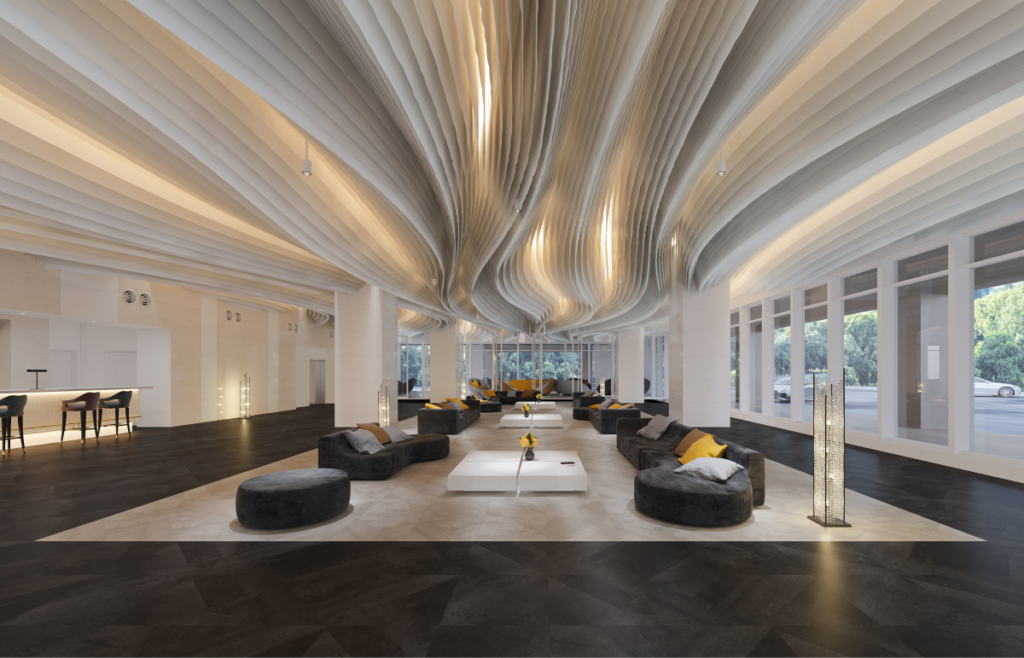
Hotel design is a crucial factor driving guest satisfaction. For example, guests expect hotel rooms to be comfortable, stylish, safe, quiet, clean, and functional. Flooring plays a vital role in the overall guest experience from check-in to check-out and everything in between, but finding the right flooring is no small task. There are dozens of floor coverings, materials, styles, and brands to consider. This article will help you understand how to choose hotel flooring, why it’s important, and how to choose between different flooring materials, including luxury vinyl flooring, hardwoods, carpet, ceramic tile, and laminate. Keep reading to learn about these options and how they’ll affect guest satisfaction and hotel operations.
Why is choosing the best hotel flooring important?
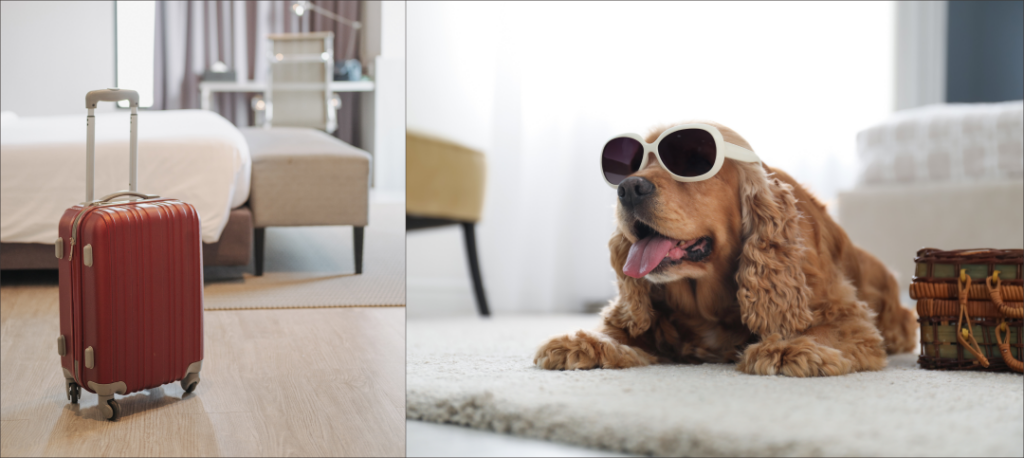
The right flooring product can enhance the hotel’s brand and image and directly affect how guests feel during their stay. Outdated designs and worn or damaged flooring can erode brand trust, lower ratings, and prevent return bookings.
It’s crucial to find a flooring product that complements the overall design of the hotel as well as its values. If the property values sustainability and eco-friendly practices, you’ll want to choose flooring that supports those commitments. It’s also important to consider how flooring choices affect hotel operations, costs, maintenance, and other factors.
Choosing the best hotel flooring is about more than aesthetics; your choices have a direct correlation with guest satisfaction, booking revenues, brand reputation, and operational costs, so let’s take a look at what you need to keep in mind when selecting hotel flooring and which options make the most sense for hospitality designers.
How to choose the proper flooring for hotel spaces
As we mentioned in the introduction, guests have certain expectations regarding guest rooms, and flooring decisions directly impact these expectations. These expectations also apply to lobbies, conference rooms, elevators, workout centers, cafes, and other areas of the property.
Here are a few things guests look for in a hotel and how flooring affects their experience.
· Design
The flooring should be inviting and aesthetically pleasing and complement the elements, color palettes, textures, fixtures, and materials used throughout the property. Flooring with neutral and soothing colors, inspiring designs, and natural-looking elements can help guests feel more at home in their guest suites. At the same time, luxurious styles can create an aspirational look that makes guests feel like royalty.
· Comfort
Loud noises between floors, rooms, and from hallway conversations can distract guests and make them uncomfortable, as can cold floors or unpleasant textures. It’s important to consider the feel of the material, its sound absorption attributes, and thermal comfort.
· Cleanliness
Hotel guest rooms and other areas must be easy to clean and maintain, supporting a spotless and well-maintained environment. Flooring that’s easily damaged, stained, or difficult to clean should be avoided.
· Durability & Functionality
Flooring surfaces should be able to withstand heavy foot traffic and high demands from a rotating array of different types of guests with different needs. Flooring with high moisture, stain, and scratch resistance is a great place to start. Flooring should also support ease of movement and accommodate heavy rolling suitcases, room service carts, cleaning carts, maintenance equipment, etc.
· Costs & Availability
As with any commercial design project, you’ll want to consider budgets and timelines. You’ll likely be renovating or designing multiple rooms with various purposes, so costs can multiply quickly. You’ll also want to ensure that the product will arrive on time and that there’s plenty of material in stock to complete your project.
Best flooring options for hotels
· Luxury Vinyl Flooring
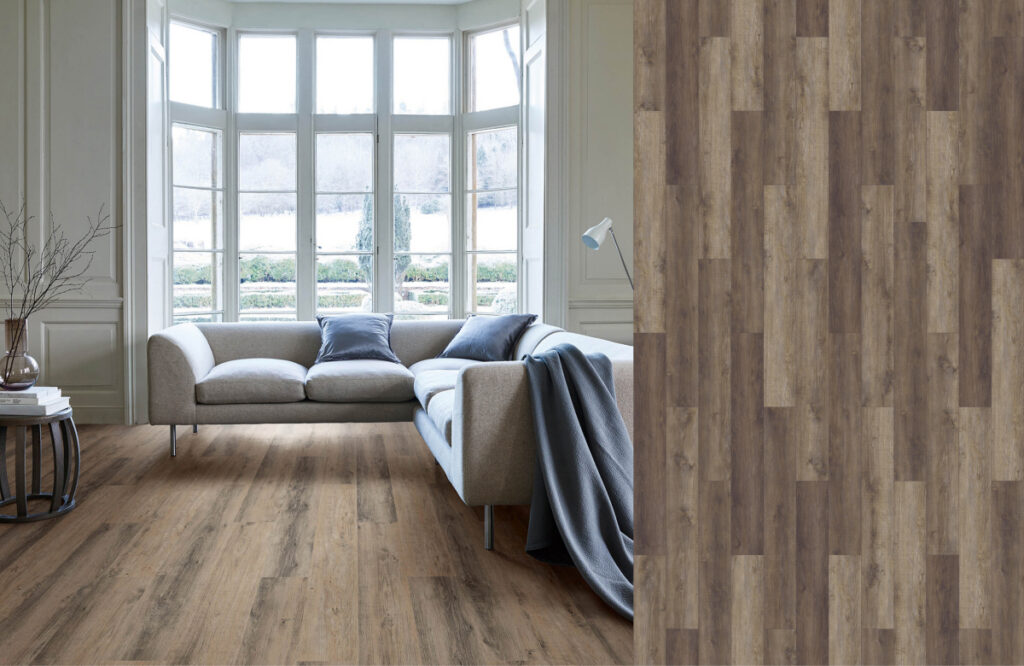
Luxury vinyl tile and plank flooring are fantastic flooring options for many hotels. Vinyl flooring is available in numerous colors and patterns, including styles that closely resemble wood and stone. There are even products that mimic rare and coveted marble.
Thanks to advanced wear layer technologies, vinyl flooring can withstand years of heavy usage and foot traffic. It’s stain, scratch, and moisture resistant, making it easy to clean and maintain without sealants, or special equipment and cleaners. Spills can be wiped up with a damp cloth, and routine sweeping, vacuuming and mopping will keep the flooring in top form.
Many vinyl flooring products provide excellent sound absorption, thermal insulation, and underfoot comfort. The products are also cost-effective and can be installed in numerous patterns to aid with wayfinding and space separation, further enhancing design and functionality.
· Hardwood
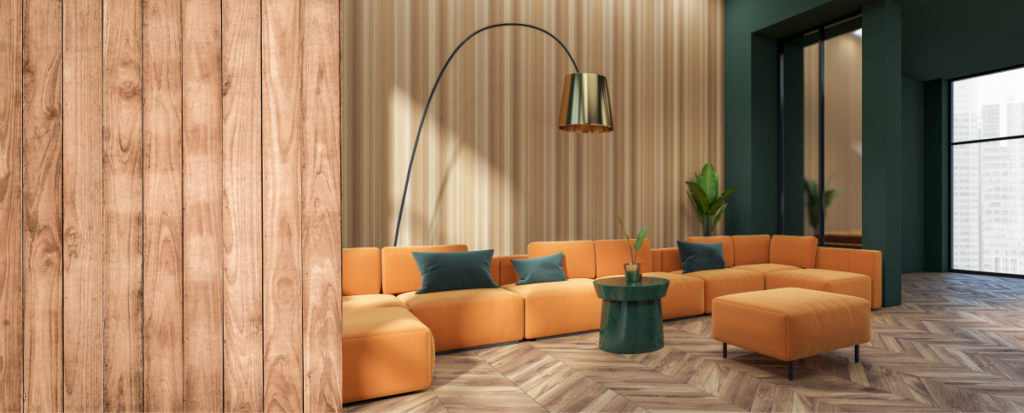
Wood flooring can be an attractive option for upscale or historic hotels, but it can also be expensive with several drawbacks. Still, hardwood flooring can create a luxurious and timeless design and enhance critical areas such as lobbies and grand halls.
Hardwood floors are relatively easy to clean and maintain, but they can be damaged by spills, chemicals, water, and even rolling suitcases with faulty wheels. Wood flooring offers little sound absorption, adding to the noise from footsteps, rolling equipment, dropped bags, and more.
· Carpet
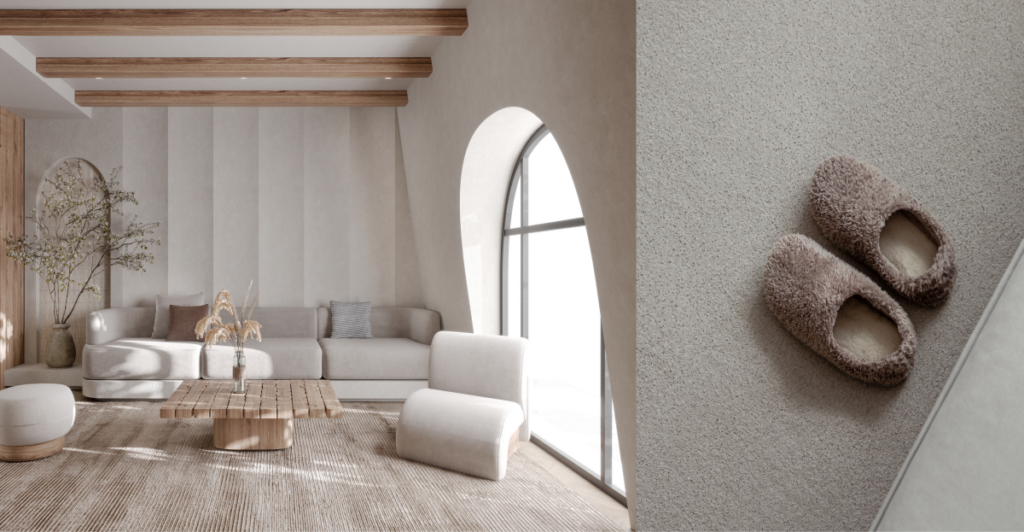
When it comes to comfort, thermal insulation, and sound absorption, carpet is an ideal material. However, it can be challenging to keep it clean and looking new. Due to stains, moisture damage, and harsh chemicals, carpet may need replacing more often than other flooring options. Carpets can also trap dirt, dust, and allergens and hold onto smells, making it difficult for properties to score high for cleanliness.
Carpet remains a popular choice for guest rooms; with its cozy feel, unlimited design choices, advances in stain resistance, and comfort qualities, carpet is an affordable option that’s still very popular.
· Ceramic & Porcelain Tile
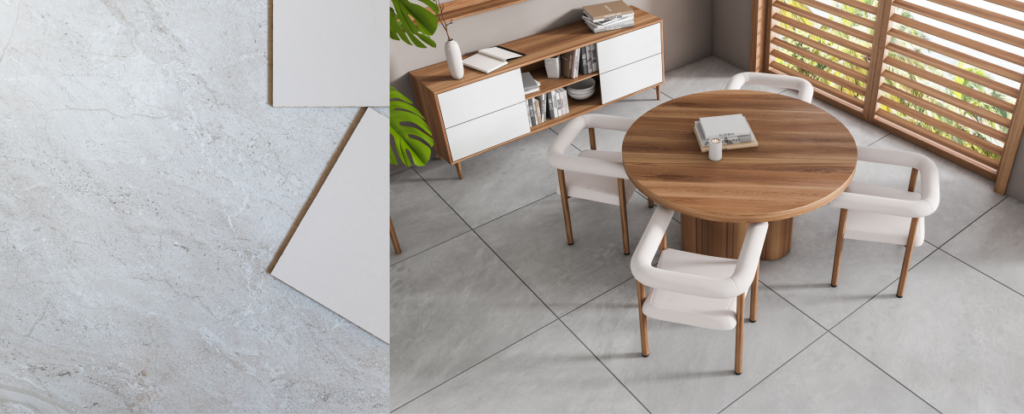
For years, ceramic and porcelain tiles have been used in hotels for their durability, easy maintenance, and aesthetic appeal. Porcelain, a ceramic tile with better moisture resistance, is ideal for shower walls, bathroom floors, and even outdoor areas.
Ceramic and porcelain tiles come in various colors, patterns, textures, and finishes that can add a touch of luxury, elegance, and sophistication to hotel spaces. There are numerous ways to install and lay out the tile to create stunning, unique designs. However, high-quality ceramic and porcelain tiles can be expensive; still, they may be the perfect option for many high-end and luxury brands.
Ceramic tiles are highly durable and resist stains, chipping, and damage from foot traffic, rolled bags, and heavy usage. Ceramic flooring is easy to keep clean with routine vacuuming and mopping, and it’s also easy to clean up spills and stains with a damp cloth or gentle cleaners. Ceramic tile flooring does have a few drawbacks — it’s cold, hard underfoot, and may become slippery when wet.
· Laminate
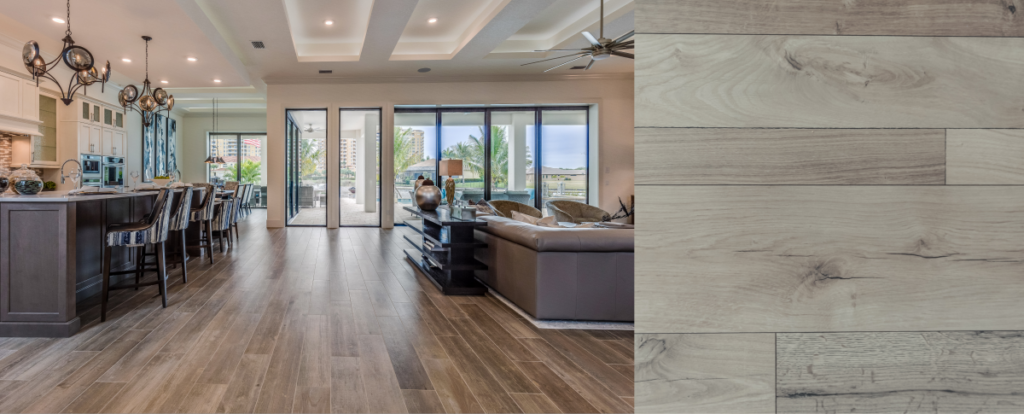
Laminate flooring is a durable and affordable option for many hotel brands. Laminate resists stains, scratches, and fading and can withstand high traffic and daily wear and tear. A range of styles and products are available, including those that resemble wood and natural stone. Laminate may not be the best option for luxury brands, but it can be a practical option for properties prioritizing low maintenance and affordability. Laminate is less durable and less high-end than some of the other options. It can also be noisy and slippery underfoot; however, it’s often the perfect option for budget, mid-tier, and busy properties.
Contact us
If you’re planning a new hotel design, remodel, or renovation, we can help. Whether you need samples or advice about your best flooring options, our experts are available for a consultation. Contact us now to start a conversation.

